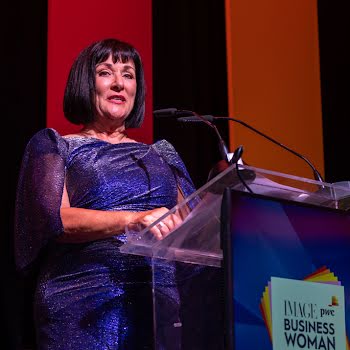
Reverse mentoring and change programmes are the future of the workplace
By IMAGE
17th Aug 2020
17th Aug 2020
Author Jane Ryan reflects on the future of working from home for working women, by examining presenteeism’s past.
I wrote an article recently about women working from home without any impact on their career advancement and I received so many positive replies I decided a corollary was needed.
Have you noticed that the sight of small and not so small children coming into rooms and being broadcast to the nation on television or live streaming no longer results in laughter and red faces? Now it’s the norm and the child simply smiles and leaves the room, or picks up what they want while the parent/carer continues on with their reporting. I would imagine it’s one-hundred-fold on work Zoom calls and has stopped being remarkable or extraordinary.
Attitudes are changing. A couple of years ago I was on a conference call in my office, one of the participants was at home and making dinner in the background, it was nearly 8pm and no comment was made. When we hung up I walked into the EMEA sales director’s office – he’d been on the call in his office – to give him reworked projections. ‘I assumed that was you clanging about the kitchen!’ he said. I could see him mentally giving me back brownie points, but the power balance was too skewed against me to tell him where to put them.
Dinosaurs in need of help
He was a dinosaur. However, in today’s culture many of these dinosaurs want help and feel out of touch. Our corporate boards are still predominantly white male, many with stay-at-home partners. Figures from the Central Statistics Office in 2019 show 20% female directors and 7% with a female chairperson. It bears little resemblance to the lives of their employees and the smart ones are waking up to all manner of out-dated behaviour that’s holding their organisations back.
If you look at our modern heroes – apart from the Irish executive who invented the ventilator splitter – not many are Chief Executive Officers or their cohorts. We’re much more likely to look at Elton Castee (and his not for profit Send It Society) or the Irish medics on our frontlines and those who volunteer to go overseas to war torn countries. So what happened?
I’m old enough to remember the ‘cult’ of the CEO, when Jack Welch’s book was a management tome carried around by my own line manager. Now it’s a cautionary tale of white privilege and how not to run an organisation. But where to turn, if you’re a director or senior manager and want progressive change for your organisation?
Change programmes
Covid 19 has changed how we work, that’s a fact. People are just as productive from home as they are in the workplace, so let’s begin there. Returnships and reverse mentoring are good initiatives to kick start any diversity and inclusion programme for an organisation who wants to optimise their workforce and productivity. And that’s what this is about, for old school executives – both male and female – who are not motivated by Corporate Social Responsibility and pay lip service to work-life balance these ‘change programmes’ are real and benefit any organisation in a material manner. I spoke to Catherine Oliver founder of The Bluebell Partnership in the UK about her role as a Diversity & Inclusion Advisor.
‘My role has evolved – as these things do – I say to clients approach it (staff inclusion and diversity) the way you would any other project. This is not a fluffy thing. This is something that’s going to make a difference to your business. Work out what your vision is, analyse your data and pull it together the right way. ’
Working parents
Catherine has worked in corporates for over twenty years, first as a digital marketeer, then she moved to Sky and switched to a strategy role on big change projects. After her maternity leave even though her team were incredibly supportive, she felt somewhat isolated at work, given she was the only new mother in her peer group and missed that connection with others who were going through the same thing.
Catherine set up what is now known as Parents@Sky, a network for working parents. Catherine is clear about using the description ‘parents’ instead of mothers, inclusion is for everyone. It began with talks on work-life balance and grew to supporting and retaining those becoming parents through a series of workshops, pre, during and post parental leave, with an online forum and more. Now she offers talks and similar sessions in both workshop and 1-2-1 formats to clients, as well as more strategic advice on creating a wider inclusion strategy.
Her most important advice to companies is to treat it like a ‘change programme’ and give it the resources it needs. Women going out on maternity leave, particularly for the first time, need advice on how to approach line managers about their leave and prepare for their return before they go. Catherine remembers while on maternity leave her email account was deleted, from her perspective it was worrying. From her employer’s perspective it was an attempt to make sure Catherine wasn’t disturbed during her time with a new baby, but as neither communicated about it, rather than being supportive it was arbitrary. Line managers also need help in understanding what they are allowed to ask, how they can best support employees and to understand if an employee (going on a career break or maternity leave) gives you a handover plan, it isn’t an obsolescence plan.
Reverse mentors
Inclusion and diversity are buzz words in the media – all you have to do is look at Twitter or Instagram over the last six months to get a taste of the significant issues our global society is facing – to understand corporations and workplaces have a part to play. And I’m just going to say it right out – if you’re white and male in a senior position in a large organisation – you need to be on a reverse mentoring scheme.
During my career I was fortunate enough to have some superb mentors, all male and those that were interested (and not just ticking a box on a management by objectives sheet) were keen to share their wisdom. And it was wisdom, based on structured dialogue, agreed ground rules, identified goals and challenges. Some sessions were the most useful of my career. However, it was all one way traffic, I was there to learn and prepared to take the learning in whatever way it was delivered. That has changed.
Many senior managers and board directors struggle with dealing with topics they perceive as sensitive or simply have no experience of, such as pregnancy, diverse ethnic backgrounds or LGBT. Reverse mentoring in any organisation should be based on trust, confidentiality, mutual respect and sensitivity. A board member or senior manager is paired with a junior employee to help them feel better equipped to lead on this topic, to share concerns and get an understanding of different experiences.
To find out how they would like to be viewed in the organisation, how recruitment can be managed differently or what possible changes the organisation could make to be more inclusive. Social media is always a good place to start, often a senior executive will have little exposure to the social media landscape and how best to interact with it, or the impact of social media on minorities. The point being, reverse mentoring is a safe place where there are no foolish questions and the aim is understanding and growth. What organisation doesn’t want that?























